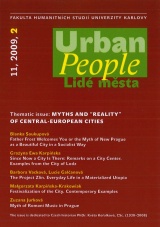Saint Petersburg – Leningrad – Saint Petersburg
Mythization of the City
DOI:
https://doi.org/10.14712/12128112.3662Klíčová slova:
Historic City, Mythization of the past, St. PetersburgAbstrakt
A characteristic feature of the contemporary language of popular culture is an attempt to present Saint Petersburg in the categories of the superlative and greatness. A popular history of the city is based on a few selected events: 1. Founded in 1703 by Tsar Peter the Great who subsequently appointed himself emperor, the city gave rise to a new Russia which was being built in opposition to the old Rus; 2. In the years 1712–1918, it was the capital of the Russian Empire and the seat of the Tsars of All-Russia; 3. It vaunts rich revolutionary traditions and above all the outbreak of the Great Socialist October Revolution of 1917 which initiated the era of communism in a sizable part of Europe and of the world; 4. It survived heroically the German blockade lasting nearly 900 days from September 1941 to January 1944; the blockade cost over a million human lives, yet the city was not vanquished. The above four events create a framework and at the same time an important context within which the myth of St. Petersburg’s-Leningrad’s greatness develops and grows. This myth is composed of a few mutually interconnected concepts: 1. The idea of a new beginning and a doubly new one at that – as devised by Peter the Great and then the Soviet one which led to an avalanche of Socialist transformations all over the world; 2. The idea of a strong center which is expressed in the concept of the imperial capital, reinforced by the majesty of the authority of the tsars and the birthplace of the Great Revolution; 3. The idea of the might and power of the imperial All-Russia, the potential of the Great October and the indomitableness of Leningrad. The contemporary ruler of Russia, Vladimir Putin, himself a citizen of St. Petersburg by birth, skillfully takes advantage of the myth of the great Peter: founder, builder, reformer and invincible ruler; this helps him build his own political image. Vladimir Putin takes advantage of every possible opportunity to increase the significance of St. Petersburg and by doing so of his own person. Putin likes to emphasize his close ties with his native city. Paying great attention to his own publicity, he carefully chooses the occasions to visit the old capital. In the year 2003, Saint Petersburg celebrated the 300th anniversary of its foundation. In accordance with Putin’s wish, the Jubilee was to be grand. On many occasions Putin declared publicly that it was an excellent opportunity to show Russia’s might and its true source. In the manner of Peter the Great, Putin opened the imperial gates of Russia to the contemporary world. The myth of the greatness of the state and of its ruler continues to flourish on Petersburg soil and from time to time it reveals to the world its successive form.
Stahování
Publikováno
Jak citovat
Číslo
Sekce
Licence

Tato práce je licencována pod Mezinárodní licencí Creative Commons Attribution-NonCommercial-NoDerivatives 4.0.


